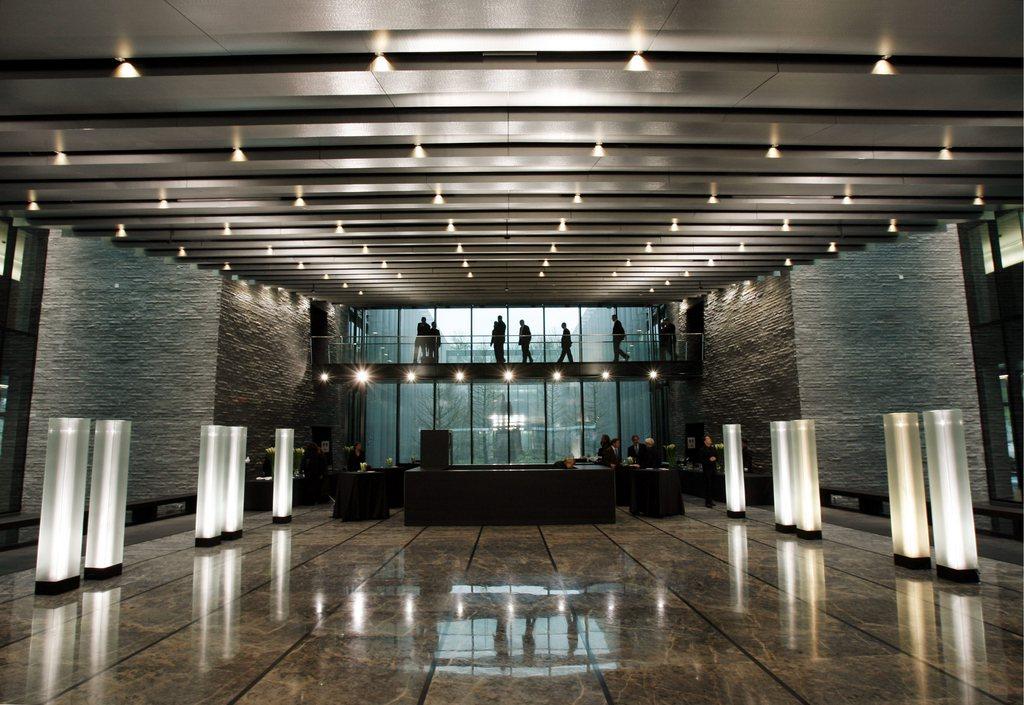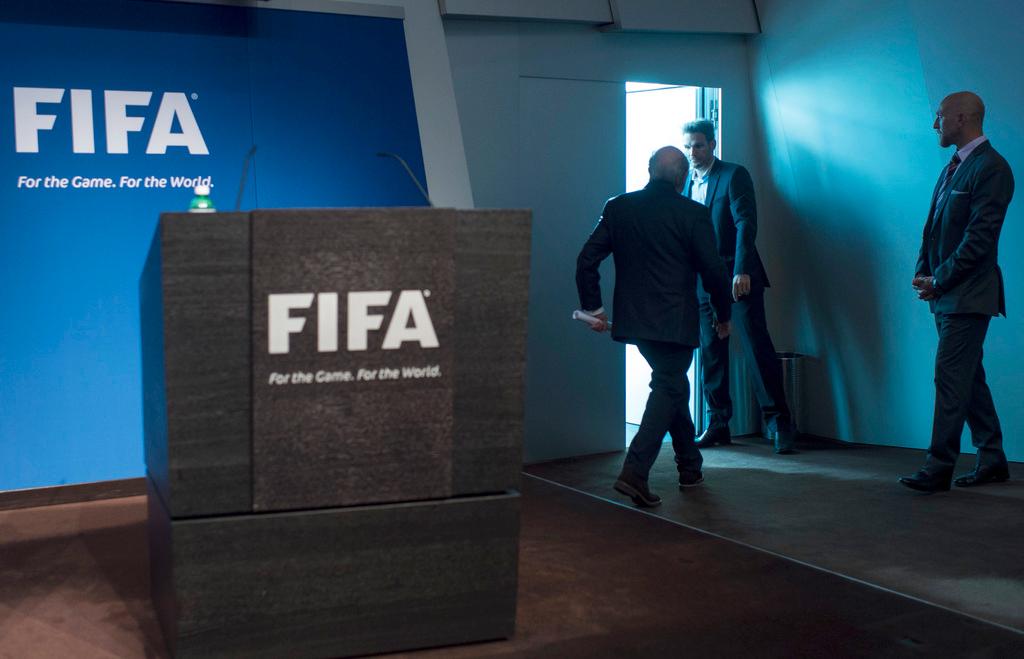How NGOs see FIFA funding

Since the FIFA corruption scandal broke, a number of organisations receiving support from the football body, including Interpol and the Nobel Peace Center, have cut ties with the organisation. Are non-profits in Switzerland thinking of doing the same?
In Switzerland, FIFA confirmed allocating financial support to at least three domestically based NGOs, through a social responsibility programme, as well as to three universities. swissinfo.ch spoke to them.
At the centre of FIFA’s sponsoring efforts is its programme Football for Hope, launched in 2005. It provides funding to grassroots associations, which use the sport as a means of promoting social development. streetfootballworld, founded by a Schwab Foundation Social Entrepreneur, manages the distribution of most of Football for Hope’s funding of NGOs, including Right to Play, an organisation promoting sports amongst children living in poverty, conflict-affected areas or with diseases.
Right to Play
Anja Levermann, Right to Play Switzerland’s co-director, told swissinfo.ch that it was “happy to get funding from FIFA in order to reach our goals”, which included “integrating our programmes into national policies”. Her partner, Sonja Ringdal, agreed, saying it was important to look at the work being achieved due to the contributions.
Annually, Football for Hope gave CHF30,000 ($31,600) to two projects in Ghana and Pakistan run by Right to Play. In previous years, FIFA supported its missions in Mali. On Pakistan, the organisation’s co-director, Nicole Moran, explained that the money supports work with children between the ages of 6-18 years, including girls who are generally excluded from schooling and sports.
Philippe Blatter
At the time that FIFA president Sepp Blatter’s nephew, Philippe Blatter joined Right to Play Switzerland’s board in 2005, he was a partner and principal at consulting firm McKinsey. Over two years during his employment there, FIFA’s relationship to McKinsey came under increasing scrutiny, as the international football body paid the firm some CHF12 million for consulting services. In 2011, after the younger Blatter moved jobs, FIFA awarded Infront Sports rights to sell television contracts for the 2018 and 2022 World Cup tournaments
Infront Sports says it has been misrepresented in the media and points out that Infront’s FIFA business only represents a minor part of the company’s diversified portfolio. Philippe Blatter stepped down from Right to Play’s board in 2014.
On Right to Play Switzerland’s board until last year was Blatter’s nephew Philippe Blatter, president and CEO of Infront Sports, which was awarded the media and global sales rights for the 2002 and 2006 World Cups by FIFA. The FIFA president’s business relations with Philippe came under scrutiny in 2000, when he hired consulting firm McKinsey at the time his nephew worked there.
Levermann said Philippe Blatter had “strategic know-how”, given his capacity as a partner and later principal at McKinsey. After becoming Infront Sports’ CEO, she said, he became busier, travelling often, and for that reason, decided to resign.
Terre des Hommes
Another Swiss-based NGO listed as a 2015-2016 Football for Hope recipient is Terre des Hommes, for a programme in Burundi.
However the organisation’s relationship to FIFA may not be so clear cut. Marc Kempe, media spokesman for the Lausanne-based foundation, explained that the Burundi project “was not actually our project. We had no contractual relationship with FIFA.”
He said FIFA originally contacted the organisation to build football sports centres, “as we have experience working there, but we refused as we have no experience in constructing and managing sports centres”.
Terre des Hommes recommended a local partner to FIFA, according to Kempe, who specified that “the contract was between FIFA and the Burundi NGO”. The charity’s websiteExternal link, however, describes a “sports centre built by Terre des hommes, funded by FIFA and managed by Terre des Homme’s local partner”.
Following Blatter’s announcement of his resignation last month, Terre des Hommes International Federation’s secretary general, Ignacio Packer said his departure was only a starting point for fundamental change. “Human rights and especially children’s rights need to be at the heart of all stages in the bidding process, including implementation in the ‘real world’ and evaluation.”
CASPEA
The Zurich-based CASPEA Foundation, originally known as exCHANGE FOR PEACE, also received funds from the football body. Its director Claude Ribaux, said it had received money, on one or two occasions, estimated at CHF20-30,000 for programmes which promoted sports training to foster peace.
In 2010, in spite of a renewed request for financial support for its Jordanian programme, CASPEA only received a donation in kind from FIFA, in the form of hats and balls.
With FIFA’s Football for Hope programme then being managed by the Berlin NGO streetfootballworld, CASPEA decided not to apply for further donations as they were too limited in size. Ribaux explained that “all sports organisations were fairly similar”, generally lacking an understanding in the need for long-term requirements when instituting programmes in developing countries.
When asked about receiving money from FIFA, following accusations of corruption, he said it would not be a problem if it happened again. “In spite of accusations, FIFA’s contributions play an important role” for the beneficiaries of the funds.
Ribaux commented that a certain assurance came from accepting money from a large organisation. “If I get a donation of CHF5,000 from a private person how can I know if it is clean money? If it’s a small organisation how can you check it? At least with FIFA there is some sort of accountability process.”
University programmes
Aside from the football programmes, FIFA has also been financially important for at least a couple of Swiss universities.
For Tim Goethals, an alumnus from the University of Neuchâtel’s FIFA Master, a sports management degree, there is a “certain concern” amongst classmates about holding a title known after the embattled football organisation.
“What has happened might offer an opportunity for improvements within the organisation. There are examples of other sport organisations who came out stronger after having tackled crisis situations and reviewed internal processes,” Goethals added.
Neuchâtel, together with the University of Bocconi and the University of Leicester initiated the degree ten years ago, with FIFA’s financial support. Vincent Schatzmann, secretary general at the university’s Centre for Sports Studies (CIES), said that aside from three student grants totalling CHF120,000 annually allocated to students, the total sum of FIFA’s financial support to the university was not public.
Jean-Loup Chappelet, a professor in public administration at the University of Lausanne said however said the FIFA Master is almost completely supported by FIFA, while two chairs at another sports law programme at the same university were also FIFA financed.
“Behind social responsibility – in sports programmes intended to help different people – there is the idea of ethics. The sources of financing are then clearly an issue that exists. Not just in sports, but also for universities.”
In 2013, funding from bank UBS for the University of Zurich generated questions regarding the academic autonomy of the institution.
FIFA also supports an international sports law degree at the University of Zurich and a chair in sports medicine at ETH Zurich.
New rules?
So, should funding contracts with non-profits reference rules on ethics and good governance?
That’s the question raised by Chappelet. “In all the projects between NGOs and FIFA, which involved financing by FIFA, contracts were signed.”
“These contracts should have included ethical rules, on transparency and good governance, on autonomy and independence for the projects. This is fundamental and should be demanded by all those which receive sponsoring, so that the sponsor would be prohibited from putting its nose into the running of the project or the organisation.”
In June, streetfootballworld CEO Jürgen Griesbach wrote on the group’s website, “Like every football fan I was saddened to read … about yet more examples of people corrupting the sport to enrich themselves at the expense of the true nature of the game… In [NGOs] … lies the true power of the game.”
TIMELINE
1998: Sepp Blatter elected president of FIFA, amidst allegation of bribes made to vote against adversary Lennart Johansson.
2001: FIFA’s marketing firm, International Sport and Leisure files for bankruptcy. Subsequent investigations show that FIFA officials received millions of dollars worth of bribes from ISL.
2010: FIFA awards the 2018 and 2022 World Cups to Russia and Qatar
2011: Former FIFA executive Mohamed Bin Hamman found guilty of bribery.
November 2014: A report by Michael Garcia, heading an investigation into corruption allegations, is only partially published.
May 27 2015: FIFA officials and businessmen are arrested on charges of buying and selling votes in the 2018 and 2022 World Cup bids. Swiss and US authorities announce investigations.
May 29: Blatter is re-elected as FIFA president for the fifth time.
June 2: Blatter announces his resignation from the organisation.
June 10: FIFA suspends 2026 World Cup bidding process amid the ongoing scandal.
June 11: Vatican says it will no longer accept donations from CONMEBOL, South America’s football association, for a charity sponsored by Pope Francis, Scholas. A former CONMEBOL head Eugenio Figueredo is amongst arrested FIFA officials in Swiss detention.
June 12: Interpol suspends anti-match-fixing programme with FIFA, amidst corruption allegations.
June 16: Nobel Peace Center announces ending of agreement with FIFA on Handshake for Peace, an initiative begun by Blatter, who had harboured hopes of winning the Nobel Peace Prize.

In compliance with the JTI standards
More: SWI swissinfo.ch certified by the Journalism Trust Initiative


You can find an overview of ongoing debates with our journalists here . Please join us!
If you want to start a conversation about a topic raised in this article or want to report factual errors, email us at english@swissinfo.ch.